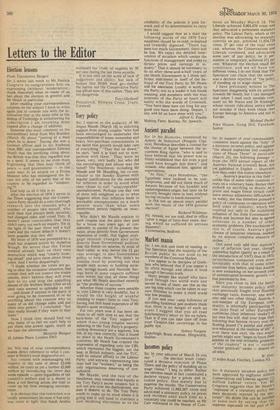Tory policy
Sir; 1 marvel at the audacity of Mr Angus Maude (March 16) in soliciting support from young couples "who had been encouraged to undertake the responsibilities of home ownership and heavy hire-purchase commitments in the belief that growth would take care of everything." "They feel let down," he says, "and it is hard not to sympathise with them." They were let down, very, very badly, but who did the encouraging and whose was the belief? The Heathmen, including Mr Maude and Mr Maudling, his co-contributor to the Sunday Express with regular justifications for the necessity for inflation in order to avoid what they chose to call "unacceptable" unemployment. Perhaps one day one of them will enlighten us as to what happens when that inflation leads to inevitable unemployment on a much greater scale than what some anonymous person regards as unacceptable.
Why didn't Mr Maude explain to such couples that the price they paid for a house two years ago, at considerably in excess of its present day value, arose directly from Government expansion of credit, that higher mortgage interest changes also arise directly from Government policies; that the freeze on salaries, in most of their cases, at way below the 12 per cent average, is also Government policy to help them. Why didn't he console them by pointing out that people with money in building societies, savings bonds and National Savings have in some respects suffered even worse, but that all these things are what Mr Heath described recently as "the problems of success."
Whether these couples were sensible to vote Liberal is very doubtful, but it would be the height of wishful thinking to expect them to vote Tory, having had first hand experience of Mr Heath's quiet revolution.
For two years now it has been obvious to all with eyes to see that the back-bone of the Tory support of which ti.es. young couples naively believing in the Tory Party's propertyowning democracy are a segment, has felt, in my view correctly, that it found no place in the Heath Government's concerns. Mr Heath has created the impression of regarding only the CBI, which represents the biggest, not the best, in British industry, and the TUC, with its natural affinity to the Labour Party, and anyway representing less than half the "workers," as being the only organisations deserving of consultation.
'Mr Maude, and the rest of the Heathmen, may consider that loyalty is the Tory Party's secret weapon, but it will not win over the disillusioned, nor does it deserve to do. The Tory Party needs to make up its mind where it is going and it will need to convince a now doubting electorate as to the credibility of the policies it puts forward, and of its determination to carry them out.
I would suggest that as a start the following words of the 1970 Tory manifesto should be re-read, re-learned and inwardly digested. "There has been too much Government, there will be less. We reject the detailed intervention of socialism which usurps the functions of management and seeks to dictate prices and earnings in industry." That it should be necessary to do so after three-and-a-half years of the Heath Government is I think sufficient indictment in itself of the betrayal of the Tory Party by Mr Heath and his associates. Loyalty is surely to the Party, not to a leader it has found wanting, and members with the true interests of the Party at heart will surely echo the words of Cromwell, "You have been here too long for any good you have been doing. Depart, I say, and let us have done with you."
Alfred G. Foulds Malting Farm, Bentley, Nr. Ipswich.


































 Previous page
Previous page